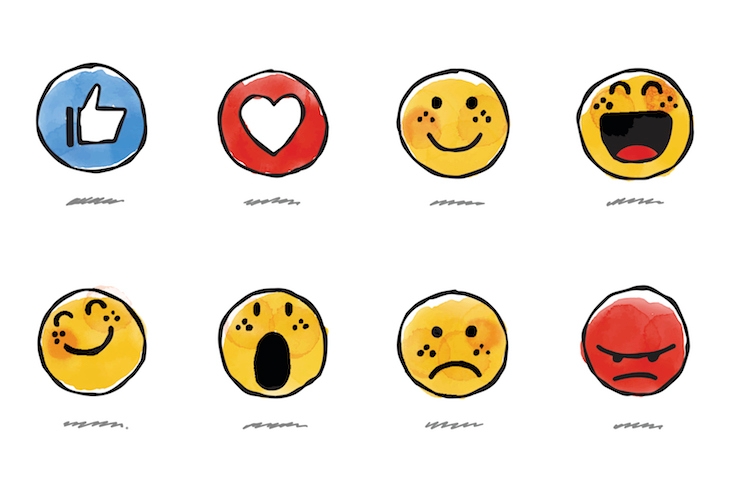Smiley face. Sad face. Smoochy face. Sick face. Edvard Munch ‘Scream’ face. How are you feeling today? Any of the above?
When I worked as a teacher at a Saturday school for children who were struggling with English and maths, my pupils, all of whom were primary school age, had two emotions: they were ‘good’ (breaktime) or they were ‘sad’ (seven times table, spelling test).
Sometimes, when teaching one-on-one, working our way through cat, cat, cats and mat, mat, mats, with the boys who were furthest behind, I would ask: ‘How do you feel about school?’ They would say: ‘I feel sad.’ But they didn’t mean that. They meant: I feel frustrated. I feel thwarted. I feel ashamed, persecuted, wronged, neglected. But the only word they had was ‘sad’.
The boys who had been hauled off to see school counsellors would say: ‘I feel angry.’ Or, in baby language: ‘I feel cross.’ Mummy is ‘cross’ because you haven’t tidied your room. A ten-year-old boy with a deepening voice and a bum-fluff moustache isn’t ‘cross’ because he can’t read or add-up or tell the time; he’s ashamed, desperate, humiliated, bitter and furious. Furious with his teachers, with his parents, and with his own mute inability to tell anyone what this state of left-behind arrested infanthood feels like. One boy, due to go up to secondary school in September, was still struggling with ‘dog’ and ‘log’. Sad? I wanted to weep.
Teachers talk of a ‘word gap’. In a study published by Oxford University Press, 800 secondary school teachers described pupils with a limited vocabulary being held back not only in English, but in history, geography and religious studies. The research cited two major problems: never reading for pleasure, and too little in the way of grown-up conversation.
The problem goes beyond reading comprehensions. The word gap — word chasm, more like — is a barrier not just to understanding, but to thought. How do you question, how do you articulate, how do you rage, howl, rebel, kick-back, all the things a curious teenager should be doing, if you have no words in your arsenal? If your entire ‘vocabulary’ is restricted to the emoji palette on your smartphone? Snorty face. Winky face. Sweaty face. LOL face.
I like an emoji as much as the next snap-happy Insta-floozie, but they have their limits. Part of growing up is grappling with your own unruly emotions, impulses and ambitions, and tempering your more selfish instincts to the equally unruly needs and feelings of others. You cannot successfully make that leap if you conceive states of mind only as gurning ready-made cartoons.
My pupil who was going through agonies with the sodding dog on its godforsaken log would be doing Oliver Twist the following year. There, in the first five pages, he would encounter sorrow, consolation, passion, haughtiness, drudgery, treachery, deception, perversity, impertinency, remonstrance and hope. He would discover the phrase ‘spirited and rampacious’. I wish a few more of my pupils had been diagnosed as spirited and rampacious. ‘He’s got ADHD,’ mothers told me as they dropped their sons off. ‘I’m hyper,’ said the boys, parroting what educational assessment officers had told them. At least it proved that when new words were offered, the boys seized on them.
The children in my more confident group came alive with Rudyard Kipling’s How The Camel Got His Hump. They loved ‘frouzly head’ and ‘snarly-yarly’. Anyone who didn’t do their homework that term was ‘most ’scruciating idle’. They were hungry for novelty. I might even say starved of it. We talk of food poverty. But not word poverty. We are appalled by diets of popcorn and chips. We should be as outraged about the children whose reading and writing diet is hearts and stars and aubergine emojis.
My class of nine-year-olds are 16 now. They must be doing their GCSEs. I fear an adolescence lived through an iPhone might have made their heads very frouzly indeed. Emojis aren’t the only culprits. A girl who might once have poured her heart into her dearest, most secret diary, now posts cat gifs. Beneath a photograph of a kitten clinging to a branch by its fingertips, she writes: ‘My mood today.’ There’s a cat for every occasion. Settling in for an evening of Net-flix? Cat purring with pleasure. Spitting tacks about unreasonable parents? Angry cat who looks like Hitler.
This is a generation dependent on outsourced emotions. Terrible teenage sense of ennui? Post a screengrab of Buffy the Vampire Slayer rolling her eyes. Guilty and repentant? Try Cher from Clueless repeating a plaintive: ‘My bad.’ Heartbroken? Here’s a video of poor, lost Britney Spears sobbing on a chat show.
Then there’s the ‘This’ phenomenon. Seen a spectacular sunset, a sweeping landscape, a pink dawn? Post a photo hashtagged #Thisiseverything. Or just #This. This #this business has dismal implications for travel, art and nature writing. What if John Ruskin, instead of labouring over his descriptions of the Doge’s Palace and San Marco in Venice, had instead taken a St Mark’s Square selfie and said simply: ‘#this…’ Something, surely, has been lost.
If you don’t read, if you don’t learn about lust, betrayal, fretful fears and vengeful instincts from literature and bother to acquire the words that go with them, then your growth, your becoming a fully fledged proper person, has in some awful, important way been stunted. Tragic face.
Now listen to Lara Prendergast and Professor Vyv Evans talk to Isabel Hardman on emojis and communication in this week’s Spectator Podcast (22:04):







Comments